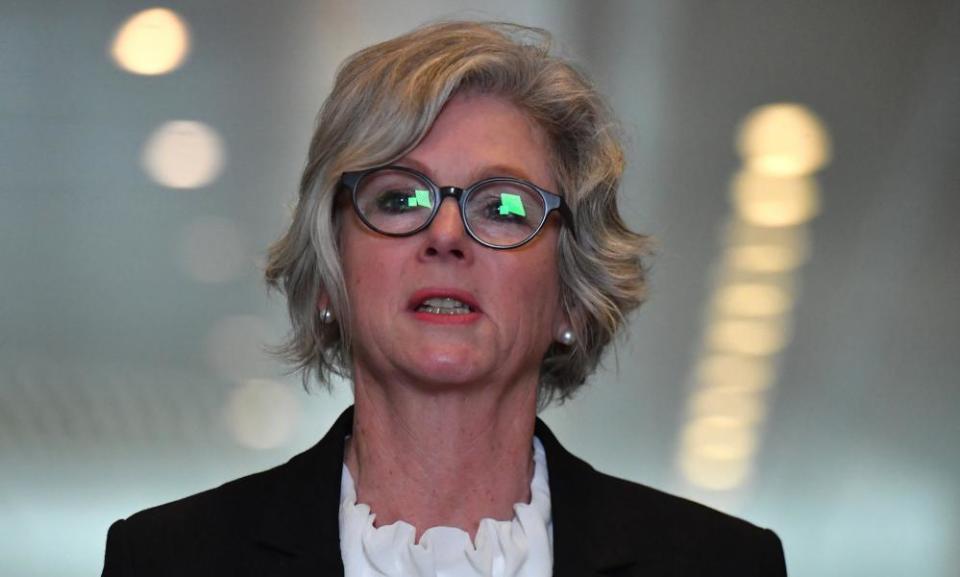Independent MP to bring bill for federal anti-corruption body as pressure mounts on Coalition

The Morrison government is expected to come under pressure over its delay in progressing a national anti-corruption commission this week, with an independent MP introducing her own bill and Labor likely to intensify its question time attack.
Declaring the government’s pandemic-related excuse “does not cut the mustard at all”, the prominent independent MP Helen Haines told Guardian Australia: “There’s nothing so delicious as a scandal and boy, we’ve had a feast haven’t we?”
Haines, the member for the Victorian seat of Indi, will introduce her bill to parliament on Monday morning and is urging the government to allocate time for debate in the near future.
Her proposed body, called the Australian federal integrity commission, would allow public hearings when in the public interest and allow any member of the public to make referrals.
She said the public understood there were “obvious and serious issues” for an integrity commission to confront, and Covid-19 had not stood in the way of other issues being pushed through parliament.
“We have debated and passed numerous bills throughout the pandemic, some rather light bills which are changing the names of departments, right through to more complicated and tricky issues like mobile phones in detention centres, for example – I’m not sure why that had to get rushed into the parliament,” Haines said.
“We’ve had the EPBC bill which is highly contentious and was not properly debated at all. That excuse – and I think it is an excuse – it doesn’t hold water at all.”
Work on the Coalition’s proposal began in 2018, and officials from the attorney general’s department confirmed last week that the attorney general, Christian Porter, received a draft bill to establish the body in December 2019 – before the pandemic began.
The fact the 300-page draft legislation was ready last summer was first revealed by Guardian Australia in January, when Porter said he was waiting “rather than starting the consultation process during the holiday period, which is not an ideal time to start a process of public scrutiny”.
Confronted about the further delays during question time last week, Scott Morrison said the government’s watchdog proposal required complex consultation, and the prime minister did not want “one public servant diverted” from managing the public health crisis.
But in a clear warning to the government about the public appetite for strong action, Haines said she had even heard feedback from community members sheltered in bushfire evacuation centres last summer – “so incredible is the public’s desire to fix this canker, essentially”.
“We’d be talking primarily about the bushfires and about their circumstances, once we’d talked about that and I just sat quietly with people, they would raise it even then. They would say, ‘Helen, you know, it’s important work that needs to be done, we need a federal integrity commission’.”
Haines’ bill is expected to be seconded by the independent member for Warringah, Zali Steggall. Haines will also introduce a bill to bring in a code of conduct for parliamentarians.
Private members’ bills are rarely debated or voted on in the lower house, given the government has a majority.
But Haines has used social media to try to drum up support for a full parliamentary debate on her bill on 3 December.
Using the hashtag, #BringOnDebate, Haines has urged members of the public to contact their local MPs “to ensure the government doesn’t shut down debate on this bill”.
She has not ruled out seeking to suspend standing orders to bring it on for debate if the government does not accommodate her request – although the numbers may not be there for such a move.
Labor’s position is to support a powerful and independent integrity commission. While it does not yet have a formal position on the model advanced by Haines, it is likely to strongly support bringing on debate.
Labor is also expected to target the government over the matter during parliamentary question time throughout the course of this week.
Signalling his interest in pursuing the issue, the manager of opposition business, Tony Burke, said the government’s failure to produce its own bill reflected “a deliberate decision from Mr Morrison to try to go on a go-slow when it comes to dealing with corruption”.
Burke said he did not think anyone could accept government’s claim about the pandemic being a reason for the delay, given that it was already drafted before the Covid-19 crisis began.
“All they have to do is print it off on their own computer, walk into the parliament, and table it and the public conversation can start,” he told Sky News on Sunday.
Last week in parliament Labor pursued the government over the $30m acquisition of land at Leppington Triangle that was worth $3m – something that is being investigated by the Australian federal police and the infrastructure department. It also chased the government over any lobbying from the former NSW MP Daryl Maguire.
On Thursday revelations of Australia Post’s spending on four luxury Cartier watches as reward for senior managers in late 2018 led Morrison to demand the chief executive, Christine Holgate, stand aside pending an investigation.
The following day, the chair of the corporate regulator, James Shipton, stood aside pending an investigation into high spending on tax advice.
Morrison has left the door open to a broader review of spending by commonwealth entities but has argued his swift action in relation to Australia Post would have sent a clear message to all executives and board members of government agencies.
“I think they got it with a rocket,” Morrison said on Friday.

 Yahoo Finance
Yahoo Finance 